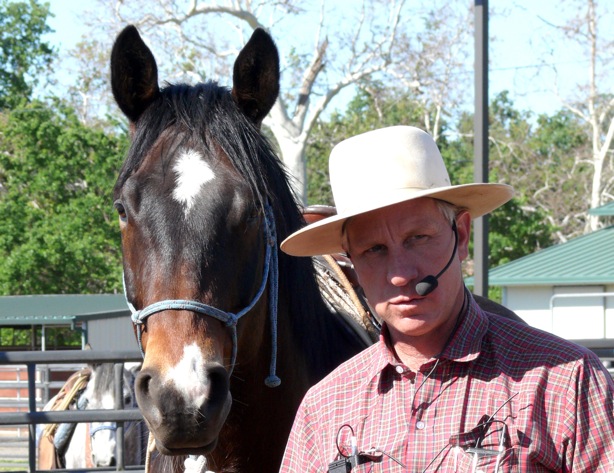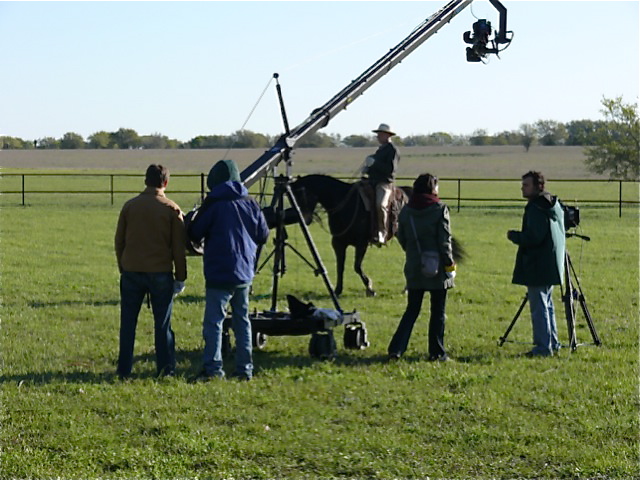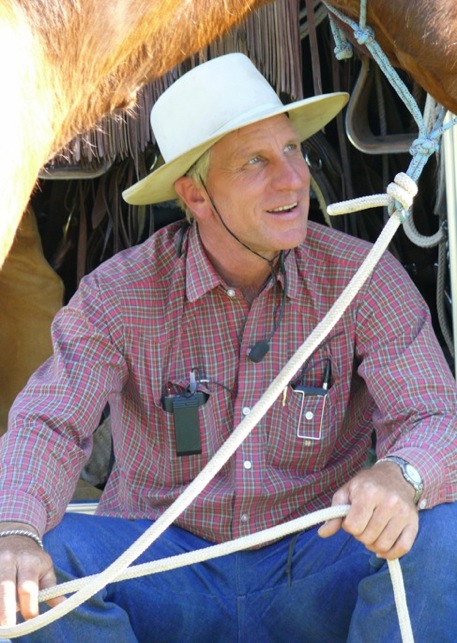CHICAGO – Excelsior! Comic book legend Stan Lee’s famous exclamation puts a fine point on the third and final play of Mark Pracht’s FOUR COLOR TRILOGY, “The House of Ideas,” presented by and staged at City Lit Theater in Chicago’s Edgewater neighborhood. For tickets/details, click HOUSE OF IDEAS.
Interview: Buck Brannaman Shares His Life Philosophy in ‘Buck’
CHICAGO – When Robert Redford was on the lookout for equine consultants to assist him with his 1998 drama, “The Horse Whisperer,” he got a lot more than he bargained for when he hired Buck Brannaman. The real-life “whisperer” was one of the chief inspirations for the character of Tom Booker in the Nicholas Evans novel that provided the source material for Redford’s picture. Yet Brannaman’s inspiring work doesn’t merely apply to horses.
As one of the most respected horse trainers in the nation, Brannaman spends the majority of the year traveling the country, hosting clinics that teach people how to better connect their beloved animals. First-time director Cindy Meehl was so inspired by Brannaman’s work that she decided to film a documentary that charted his journey from childhood abuse (at the hands of his father) to an enormously successful adulthood. The resulting film, “Buck,” has gone on to garner acclaim from both critics and audiences. In anticipation of the film’s June 24 opening in the Windy City, Hollywood Chicago spoke with Brannaman about his life’s work and philosophy.
HollywoodChicago.com: How did you first become involved in the project?
Buck Brannaman: Well it just sort of found me. Years before, Cindy had ridden with me in one of my clinics. That’s how she first became acquainted with this. About five years later, she rode again with me in Texas and later on that summer, we met again at a ranch in Montana. She said, “I just wish so many more people could hear about this. I know there’s a great message in there for people who aren’t necessarily horse people. I’d like to do a documentary,” and I said, “Well, get after it then.”

Buck Brannaman shares his life philosophy in Cindy Meehl’s documentary Buck.
Photo credit: IFC Films
HollywoodChicago.com: What instructions did you give the filmmakers in order to ensure their presence wouldn’t disrupt the horses?
Brannaman: I basically said in the beginning that this is not going to be easy for you because my loyalty lies with the people who brought me to the dance; all the people who have saved their hard-earned money to afford to come ride with me. So I’m not going to change what I do every day and have been doing for all these years. You have to find a way to anticipate what’s going to happen because you can’t set it up and I’m not going to read from a script. There are a lot of special things that happen with the horses, and if you don’t get it the first time, you aren’t going to get it again because that moment is gone forever. So she had quite a challenge in anticipating something special happening and being there when it did. But she got up to speed in a hurry because she had been to enough of my clinics to know at least a little bit of what to expect. The cameramen also started to get a feel for it. Guy Mossman was one of the cinematographers and he’s a really good fellah. Once in while, I’d see him in the arena filming something and I’d say, “Guy, you’re going to die.” He’d say, “Where do you want me?” [laughs]
HollywoodChicago.com: I assume the cameramen wanted to be as invisible as possible to the horses.
Brannaman: Yes. It can look pretty odd to a horse to see a guy walking around with this thing stuck to his head. The horse by nature tends to be very, very suspicious of things. He’s an animal whose only means of surviving for thousands of years has been flight. When something looks a little bit odd to them, the best thing for them to do is to check out and leave. So there were a few horses that gave that cameramen a long, hard look.
HollywoodChicago.com: How have you gone about connecting with a horse’s mind and soul? Is it purely through observing its behavior?
Brannaman: It really is. The body language of the horse and his response to you and the way he responds. A reaction and a response are two different things, so you study how your movement effects how he feels about you, and how threatened he might feel and how confident he might feel. Then, as a horseman, you try to adjust to the situation where he may have to work through some fear. But your goal the whole time is for him to realize that you don’t mean any harm, and then at the same rate, be able to get him to respond to you and move for you or perform for you in a certain way so that the two of you can begin this great dance together. I often tell people at the clinics that I truly want the horse to be my feet and legs. I want to be an extension of the horse and him to be an extension of me. That’s what I’m always working toward when I’m on a horse.

Buck Brannaman is filmed during the production of Cindy Meehl’s documentary Buck.
Photo credit: IFC Films
HollywoodChicago.com: Your foster mother, Betsy Shirley, has some of the most priceless lines in the picture…
Brannaman: We came to do a screening in my hometown of Sheridan [Wyoming] for a fundraiser for the Future Farmers of America. She had to come from Montana and the local district court judge and his wife drove her down there. She said, “Oh son, I just don’t want anyone to know I’m here.” She’s not really all about the limelight as you would imagine, and I said, “Are you kiddin’ me? You’re the most popular one in the documentary. They don’t even care about meeting me, they want to meet you anyway.”
HollywoodChicago.com: How did she and your foster father, Forrest, enrich your life and lead you toward this profession?
Brannaman: Forrest was not the horseman that Ray Hunt was or that my later teachers were, but he really loved horses. He and I both spent hundreds and hundreds of hours fooling around with horses and muddling our way through it. We so enjoyed spending time together and because of my background, he was the first man that I ever really figured I wanted to be like. He was a good cowboy, very knowledgeable about cattle and livestock, and so I really tried to pattern myself after him. He really did get me my start and he understood a lot about kids. As gruff as he was on the outside, he really understood that kids needed a sense of direction, a job to do, something to pour themselves into so they didn’t live in the past. They learned to live in the moment.
HollywoodChicago.com: Has your approach to working with horses reflected your approach to human relationships, such as with your children?
Brannaman: It sure does. Anybody who’s been to my clinics over the years knows that it’s really not just about horses. Cindy had that notion when she decided to do this documentary. She wanted to share this message with everyone and have it strike a chord with people who weren’t necessarily horse owners. She thought it was an important thing for people to see and I said it was going to be a challenge. It would be nice for people who would never come in contact with my little world to get a piece of this. It’s been fun for me because I’ve been to a lot of places that screened [the film] before its opening and people I never would have met in my life really get the big message that there’s such a great kinship among us.
HollywoodChicago.com: Do you sense that your daughter might follow in your footsteps?
Brannaman: I don’t know. She loves to ride, she’s a great roper and she really enjoys doing that kind of stuff with me. She’s better than most men right now and she’s only 17, which I couldn’t be more proud of. But right now, when she graduates from high school, she’s going to college to get a business degree. All I really want her to be is happy, so if she doesn’t do what I’ve done with my life, that’s perfectly all right with me.

Buck opens June 24 at the Landmark Century Centre Cinema.
Photo credit: IFC Films
HollywoodChicago.com: In the film, you reminisce about substituting a trained horse with your own horse for a crucial scene in “The Horse Whisperer.” After so many botched takes with trained animals, what was it about your horse that allowed it to hit its mark and warm up to Scarlett Johansson?
Brannaman: Well, there were a few other scenes that played out in exactly the same way. We could talk for an hour about some of the funny stuff that happened. [The crew] didn’t think it was very funny at 1,200-1,500 dollars a minute, but the primary difference with my horses is that they are comfortable with people. They want to be a part of my world and they want me to be a part of theirs. So if a person approaches them in a similar manner, they’re going to respond to them in the same way as they did to me, and of course, that’s how it worked out with Scarlett. There’s nothing more touching than seeing a little girl and a horse. It’s just a neat thing, it’s kind of hard to describe. Frankly, the trick horse is more of a slave to the human and some are treated harsher than others. Some are treated alright, but I sure wouldn’t want to be a trick horse, I’ll tell you that. It just didn’t make a good film if you were going to approach the horse scenes from that standpoint. Everything that was about Hollywood had nothing to do with my world. As we progressed through the film, it wasn’t too long before the Hollywood horse trainers and wranglers were just witnesses sitting on the sidelines, realizing that they weren’t really needed there. It’s all a union thing so they had to be there anyway. They sat around, drank coffee and watched what was real.
HollywoodChicago.com: You started out as a performer at a very early age. Do you still have a desire to entertain as well as educate?
Brannaman: As a teacher, I find a way to put people at ease so they feel comfortable around me. I like to laugh as much as the next guy but people who know me understand that I take the horsemanship very seriously and I treat it with the same integrity that one would any of the fine arts. Not everybody is going to become an artist at what they do but I have to treat everyone that seriously. I often tell people at these clinics that no matter how green they are or how inexperienced they are, I have to always remind myself that every person in that arena might possibly be the next Tom Dorrance. They might be the next wonderful gift to horses because I can’t look into the future—thirty, forty years down the line. I might’ve planted a seed that could turn into an absolute treasure. So I don’t judge people on where they start out. I take every student as seriously as the next. Outside of the context of my clinic, I like to have a good time, laugh and enjoy people. I think that’s part of it too. When people start to get to know you and share aspects about themselves, you know how to approach them.
HollywoodChicago.com: Has the structure of your life on the road provided you with comfort and stability?
Brannaman: Well, it has. I’ve been doing this long enough that there’s at least a handful of people most places I go that already know me and have worked with me. There’s always new people that go into the clinics and most of the places I go, I really feel like people care about me. There’s a really sincere relationship that’s happened over a lot of years and we’re all after the same thing. That’s what was really key about this documentary. It shows that we’re all after the same thing, some sense of peace. We’re all trying to figure out how to get through this thing and make our lives as good as we can and maybe make it better for someone else as well.
HollywoodChicago.com: The film’s unifying message is particularly welcome during these divisive times.
Brannaman: Yeah, I think it’s probably a good time for that, don’t you?
 | By MATT FAGERHOLM |


